While it’s still in its infancy, artificial intelligence already powers so many of our daily experiences – from getting product recommendations on Amazon to depositing a check via your mobile device to asking Siri to compose and send a message to a friend.
AI is also transforming the world of business – especially for revenue teams.
With AI, sellers can boost productivity and close more deals, and CROs are taking note by investing accordingly. Gartner predicts that by next year, 35% of chief revenue officers will add a centralized “GenAI Operations” team to their go-to-market organization.
By 2025,
The most innovative organizations also incorporate AI in sales enablement to ensure their sellers always have what it takes to close deals. But what does AI for sales enablement look like?
In this post, we’ll explore how AI can supercharge your sales enablement efforts and increase the effectiveness and efficiency of your sales teams. We’ll also discuss some of the top sales enablement AI tools companies use to accomplish these goals.
What is AI in sales enablement?
First things first: what is artificial intelligence in sales enablement?
Let’s break it down.
IBM defines artificial intelligence (AI) as “technology that enables computers and machines to simulate human intelligence and problem-solving capabilities. Said another way, AI is computers and machines thinking and acting like humans.
There are several disciplines within AI, including:
- Machine learning
- Neural networks
- Cognitive computer
- Computer vision
- Natural language processing (NLP)
Thanks to the explosive growth of ChatGPT, NLP is perhaps the most discussed discipline.
What is sales enablement?
If you’re reading this post, you probably already know what sales enablement is.
But in case you need a refresher, sales enablement provides sales teams with the information, sales content, and tools that enable reps to sell more effectively and efficiently. In other words, you’re working to create an entire team of top performers.
AI in sales enablement: where the magic happens
Sales enablement and AI are both powerful on their own. But the real magic happens when AI is incorporated into sales enablement.
AI in sales enablement is the practice of strategically leveraging AI to improve the effectiveness of your sales enablement program. Because your sales enablement platform is the foundation of your program, it’s the ideal place to leverage AI.
Incorporating AI into your program and software hugely benefits sales enablement teams. Today, sales enablement teams are often lean, Yet, they’re often expected to support large sales teams. With AI, sales enablement teams can support more sellers with fewer resources.
AI in sales enablement also benefits sales teams. When organizations use sales enablement AI, sellers can access the right training, tools, sales content, and resources to build the skills necessary for success. That means sellers will be equipped to close more deals, and your organization’s revenue will grow.
How can AI in sales enablement help sellers close more deals?
Let’s face it: it’s not an easy time to be a seller. In today’s environment, spending is under more scrutiny. At the same time, B2B buyers have high expectations for personalized experiences throughout the purchase journey.
Incorporating AI into your sales enablement program can be a powerful way to help sellers close more deals. Let’s take a closer look at some key ways AI in sales enablement can help improve seller performance.
#1 Recording and analyzing sales calls
Sales reps need to take notes during calls. But often, sellers are so focused on taking notes that they aren’t focused on the conversation that’s happening. After the call, sellers spend time deciphering notes and determining the next steps.
Businesses that incorporate conversation intelligence can automatically record and transcribe calls. This allows sellers to be fully present in the conversation that’s taking place. In addition, AI can analyze call recordings and provide call summaries and self-coaching tips. This helps sales reps craft follow-up communication and improves their likelihood of closing a deal.
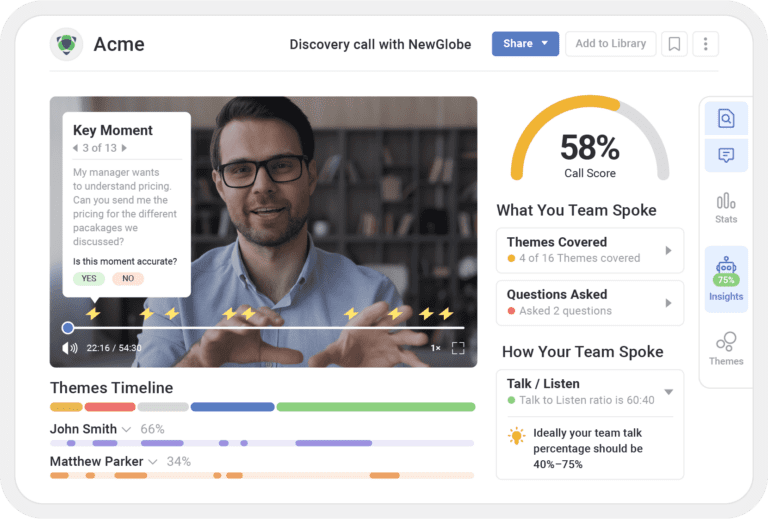
Call intelligence also scores each sales call. That way, sales managers can quickly identify when to step in to provide coaching to improve outcomes.
Finally, AI can pull themes from all recorded calls to identify what top sellers are doing differently. Sales enablement teams can then use these insights to develop enablement to help all sellers become top performers
#2 Boosting sales reps’ skills
Sales reps need to master a certain set of skills and competencies to be successful. AI can help teams identify where there are gaps and how to close them.
For example, AI can analyze myriad sales activities to determine which region is struggling with a specific skill, such as objection handling. Sales managers and sales enablement teams can also use AI to determine what steps to take to close these gaps – for example, assigning a specific training or piece of enablement.
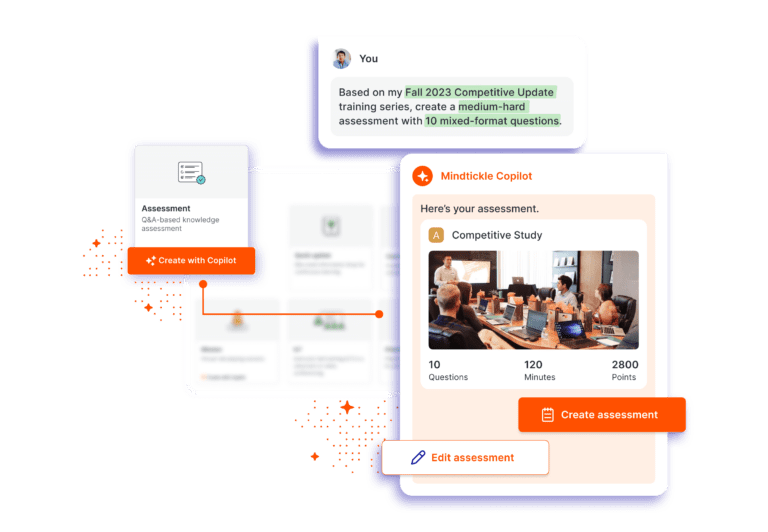
#3 Improving coaching effectiveness
Sales coaching is key to improving sales performance. But sales coaching can’t be “one-size-fits-all.” It needs to be personalized to be effective.
Delivering personalized coaching at scale can be a tall order for busy sales managers. But AI in sales enablement can help – a lot.
For starters, AI can analyze sales activities to determine what specific areas a sales rep might need coaching on. AI can also suggest steps to take to improve these skills.
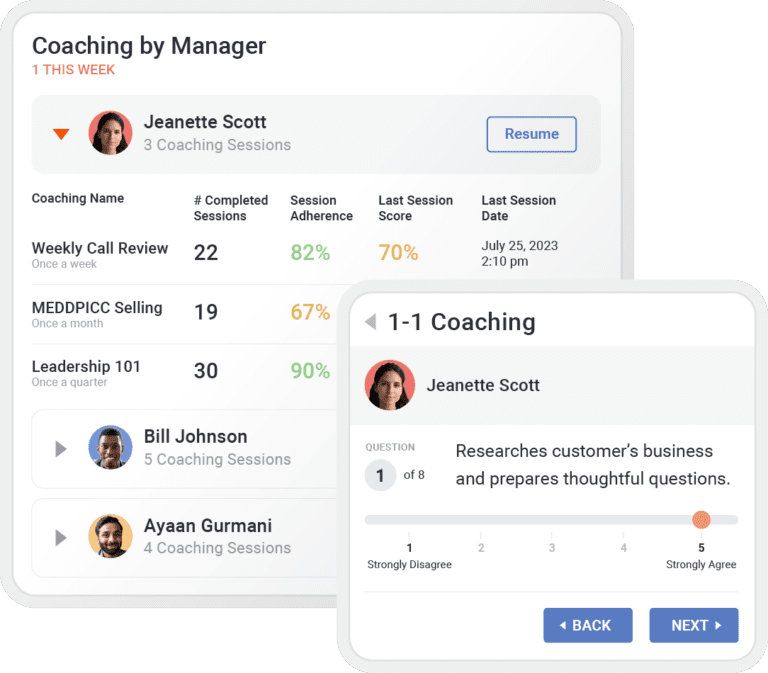
In addition, AI for sales enablement can deliver real-time coaching.
As we already mentioned, AI can deliver coaching after a sales call has happened. In addition, sales reps can record practice pitches on their own time. Then, AI will analyze the pitch, score it, and provide improvement recommendations. Sales reps can then use these recommendations and record another practice pitch. Essentially, sales reps are getting personalized, data-based coaching – without the involvement of a sales manager or sales enablement team member.
#4 Delivering sales content that resonates with each buyer
Sales content is an important component of the B2B sales journey. Per the Demand Gen Report, 55% of B2B buyers rely on sales content to guide their purchase decisions more now than in the past.
However, generic sales content won’t do. Sales reps must be able to easily search for and deliver sales content that resonates with each buyer.
But it’s hard (and time-consuming) for reps to figure out what content will work – and then find it. Research tells us 65% of reps say they struggle to find the right content to send to prospective buyers.
Incorporating AI in sales enablement makes it a whole lot easier.
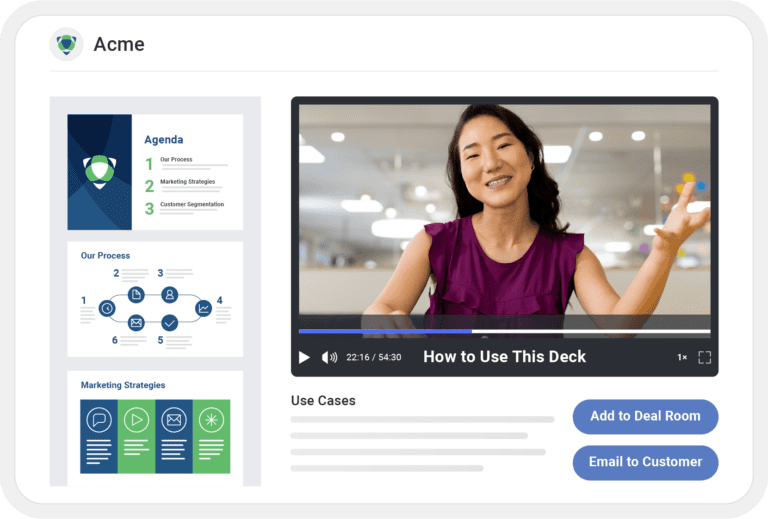
AI analyzes factors, including the buyer’s purchase signals. It also considers what content has worked for other reps in similar sales scenarios. It then uses this information to recommend content that’ll resonate with a specific buyer. That means reps can spend less time hunting down the right content – and more time delivering value and engaging with the buyer. That engaged prospect is a lot more likely to become a customer.
#5 Improving sales forecasting
Predicting revenue is important for every sales organization. But creating accurate sales forecasts can be downright hard.
According to the Chief Revenue Officer + Sales Leader Outlook Report, 34% of sales orgs view inaccurate forecasts and limited predictability as one of their top challenges. Furthermore, according to Gartner, a mere 45% of sales leaders have high confidence in the accuracy of forecasts.
This is another instance where AI in sales enablement can be huge.
AI can analyze sales activities and provide insights into the outlook of each deal. That means sales reps and managers have better insight into how many deals will likely close. These insights fuel better deal forecasting.
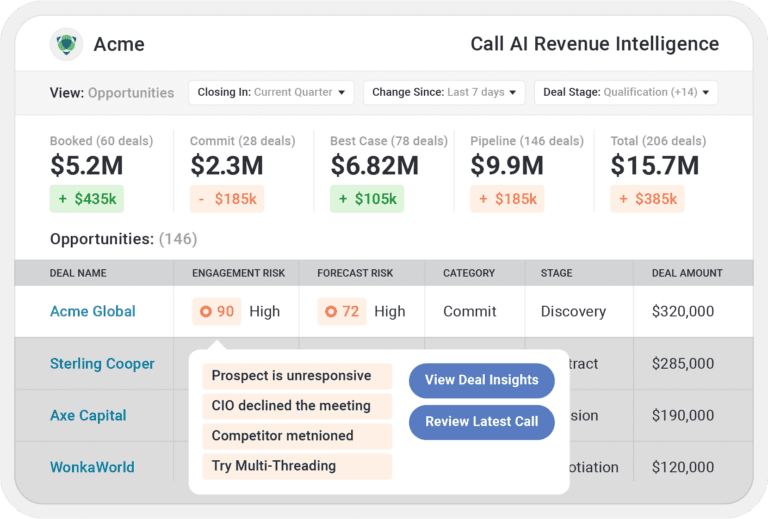
In addition, AI can help identify at-risk deals and provide recommendations for the next best action. For example, AI can suggest sales content that’ll resonate with the buyer. Or, the sales manager can deliver sales coaching to help the rep overcome the buyer’s objections.
What are the best sales enablement AI tools?
Today’s sellers depend on certain sales tools to be successful. Increasingly, these platforms are incorporating AI to improve the effectiveness and efficiency of sellers.
What are the best sales enablement AI tools? There’s no easy answer. The best sales enablement AI tools are those that fit the unique needs and goals of your organization.
However, there are some tools that stand out. Let’s take a closer look at a few.
Mindtickle
Recent research found that 84% of organizations invest in a sales enablement department. An integrated sales enablement platform like Mindtickle is a key component of sales enablement success.
Today, Mindtickle incorporates several AI features that help prepare sellers to conquer any deal that comes their way.
For starters, Mindtickle Copilot enables sales teams to analyze calls and reports to uncover key insights – and then understand what action they should take based on those insights. For example, a rep can ask, “Which competitors were mentioned during this call?” Mindtickle Copilot will then respond and recommend resources to address these objections.
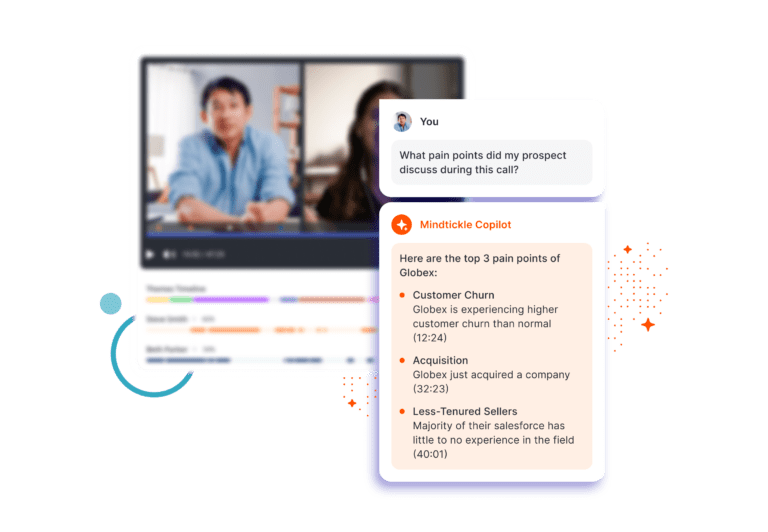
In addition, Mindtickle incorporates features that allow enablement professionals to create enablement experiences – quickly. For example, sales enablement pros can use AI to create an assessment based on learning content. Or, they can create a sales simulation that allows sales reps to practice their skills before using them in the field. This is huge, as creating sales enablement content has traditionally taken time.
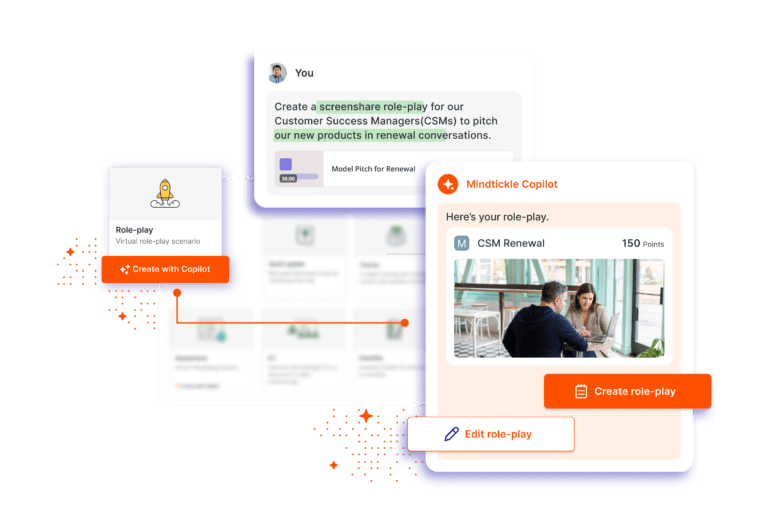
Sales reps can also use Mindtickle’s AI features to improve buyer engagement. For example, AI can help reps easily search for and find sales content that will resonate with each buyer. They can also use AI to draft personalized communications that speak to the specific buyer’s needs.
Gong
Gong captures all interactions a seller has with a buyer. Then, it leverages AI to holistically make sense of those interactions. Sales teams use these AI-powered insights to improve productivity and more accurately predict revenue.
Salesforce
Salesforce incorporates robust AI features that improve the effectiveness and efficiency of sellers. With Salesforce, sales teams can build and deploy AI experiences right within Salesforce that allow both customers and employees to work smarter.
Drift
Conversations have always been an important tool for sellers. Drift is a buyer engagement platform that enables businesses to engage in conversations at scale.
Drift is powered by AI. It listens to buyers and learns from them in order to create personalized experiences that resonate with them.
Supercharge your sales team with Mindtickle Copilot
Modern B2B buyers expect personalized, engaging experiences throughout the purchase journey. But sellers only have so many hours in the day to deliver.
Now’s the time to equip your sellers with AI-powered sales enablement so they’re always ready to engage and delight customers.
With Copilot from Mindtickle, your reps can work faster and smarter. Mindtickle combines the power of enablement and revenue opps data with AI, which allows your teams to focus more on what they do best: selling.
See AI and Mindtickle Copilot in Action
Ready to see firsthand why leading revenue teams choose Mindtickle?
Get a Demo

 By Poornima Mohandas
By Poornima Mohandas
 By Helen Waite
By Helen Waite

 New to MINDTICKLE?
New to MINDTICKLE? WHO WE HELP
WHO WE HELP COMPANY
COMPANY RESOURCES
RESOURCES